|
|
|
Sort Order |
|
|
|
Items / Page
|
|
|
|
|
|
|
| Srl | Item |
| 1 |
ID:
167998
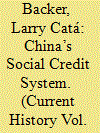

|
|
|
|
|
| Summary/Abstract |
“Social credit redirects the power of data away from markets and strengthens the state’s ability to comprehensively control behavior.” First in a series on ways of governing.
|
|
|
|
|
|
|
|
|
|
|
|
|
|
|
|
| 2 |
ID:
193208
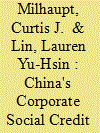

|
|
|
|
|
| Summary/Abstract |
Chinese state capitalism may be transitioning towards a technology-assisted variant that we call “surveillance state capitalism.” The mechanism driving this development is China's corporate social credit system (CSCS) – a data-driven project to evaluate the “trustworthiness” of all business entities in the country. In this paper, we provide the first empirical analysis of CSCS scores in Zhejiang province, as the Zhejiang provincial government is to date the only local government to publish the scores of locally registered firms. We find that while the CSCS is ostensibly a means of measuring legal compliance, politically connected firms receive higher scores. This result is driven by a “social responsibility” category in the scoring system that valorizes awards from the government and contributions to causes sanctioned by the Chinese Communist Party. Our analysis underscores the potential of the CSCS to nudge corporate fealty to party-state policy and provides an early window into the far-reaching potential implications of the CSCS.
|
|
|
|
|
|
|
|
|
|
|
|
|
|
|
|
| 3 |
ID:
192512
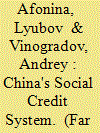

|
|
|
|
|
| Summary/Abstract |
China's nationwide social credit system (also called social rating system) aims to collect and analyze data on companies and individuals to assess their economic and social influence, civic qualities, responsibility, and financial reliability. The digital deterrence system for regulating public life appears to be a continuation of the Chinese social experiments of the second half of the 20th century. This time, however, social engineering uses previously unknown technical means free from the disadvantages of subjective evaluation and application under set parameters. Digitalization has thus provided another tool for assessing social behavior - an additional control system based on strict mathematical principles and, importantly, unlike legal systems, operating in real time. In terms of its regulatory function, it is comparable to ethnical norms and morality.
|
|
|
|
|
|
|
|
|
|
|
|
|
|
|
|
| 4 |
ID:
175479
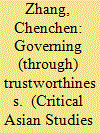

|
|
|
|
|
| Summary/Abstract |
This article examines the technologies of power and subjectification in China’s social credit system through a theoretically informed analysis of policy and legal documents as well as the narratives of social credit practitioners, including local officials and representatives of business partners. The ongoing project is a heterogeneous ensemble of discourses, regulations, policies, and any number of programs aiming to govern social and economic activities through problematizing, assessing, and utilizing the “trustworthiness” of individuals, enterprises, organizations, and government agencies. Drawing on governmentality studies, the article explicates the operation of governmental and disciplinary-pastoral modalities of power in the project, which are interrelated in their logics and overlap in the tactics employed. Whereas the strategy of governmental/biopolitical power is centered on achieving effective economic governance and improving regulatory compliance through technological fixes, disciplinary-pastoral power aspires to shape individual behavior and the collective mores of a locality according to a mixture of market-oriented and socialist-traditional values. Social credit is envisioned to produce and channel homo economicus and homo moralis. However, the relationships between liberal and socialist subjectivities and between rationalization and moralization are by no means coherent. The assemblage of social credit government is characterized by contradictions and contestations.
|
|
|
|
|
|
|
|
|
|
|
|
|
|
|
|
| 5 |
ID:
189973
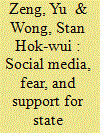

|
|
|
|
|
| Summary/Abstract |
Even in authoritarian regimes that enforce vigorous information controls, netizens are still able to access fairly diverse – sometimes even sensitive – information from social media than from traditional media. We argue that this ‘breathing space’ in social media may have an indirect positive effect on regime stability via a subtle emotional channel; exposure to news on social media heightens one’s generalized fear, which in turn increases one’s demand for social controls by the state. We test our argument using an original survey that evaluates public support for China’s social credit system. We find that the support for this seemingly all-encompassing surveillance system is positively correlated with one’s generalized fear, while one’s generalized fear is positively correlated with one’s exposure to news on WeChat, the most popular social media platform in China.
|
|
|
|
|
|
|
|
|
|
|
|
|
|
|
|
|
|
|
|
|